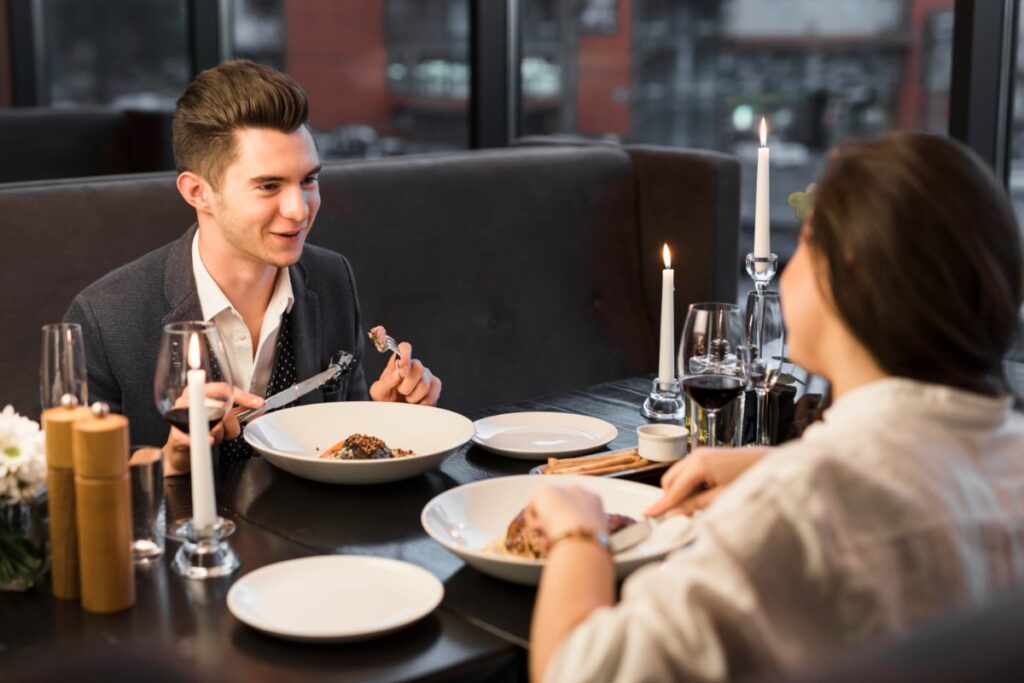15 Etiquette Rules That Instantly Show Real Class
Knowing the unspoken rules of etiquette can truly shape how others perceive you. These subtle behaviors often distinguish genuine class from just surface-level manners.
Understanding little-known etiquette rules helps you navigate social situations with confidence and grace. Paying attention to these small details can make a meaningful difference in how you connect with others.
Never point your fork at someone while talking

When you’re engaged in conversation at the table, avoid using your fork to gesture at others. Pointing your fork can come across as rude or aggressive, even if you don’t intend it that way.
Keeping your gestures calm and polite helps maintain a pleasant atmosphere.
If you need to emphasize a point, try using your hands without utensils. It’s a subtle way to show respect and keep the mood friendly.
Remember, dining etiquette is about making everyone feel comfortable, including yourself.
Place your napkin on your lap the moment you sit

When you sit down, take your napkin and unfold it quietly. Placing it on your lap right away shows that you are ready and respectful of dining etiquette.
Keep your napkin there throughout the meal to catch any drips or crumbs. If you need to leave the table briefly, place it gently to the left of your plate.
Using your napkin properly signals good manners without saying a word. It’s a simple way to show you care about the dining experience.
Speak softly and avoid interrupting others

You show respect by speaking softly, especially in public or formal settings. A calm voice helps create a comfortable atmosphere for everyone around you.
Interrupting others can seem rude and impatient. Let people finish their thoughts before you respond, even if you’re eager to share your opinion.
Listening carefully instead of interrupting shows you value what others say. It also helps you understand them better and respond more thoughtfully.
Practicing this habit makes your conversations smoother and more enjoyable for everyone involved.
Use the correct glass for different drinks

You show respect for your company by choosing the right glass for each drink. Wine glasses, for instance, differ for red and white wine to enhance the flavors properly.
A cocktail deserves a fitting glass, like a martini or highball. Using the correct glass keeps the drink’s taste and presentation at its best.
Even water has its own glass, often a simple tumbler or a stemmed water glass. Paying attention to this detail signals that you care about the little things.
Next time you serve a drink, match it with its proper glass. It’s an easy way to elevate your hosting skills.
Always RSVP promptly to invitations

When you receive an invitation, respond as soon as possible. This simple action shows respect for the host’s planning efforts.
Delaying your reply can make it harder for the host to finalize details. Timely RSVPs help everyone feel valued and considered.
If your plans change, update the host quickly. Clear and prompt communication is key to keeping social situations smooth and pleasant.
Pull out chairs for guests before they sit

When you invite someone to sit, gently pulling out their chair shows attentiveness and respect. It’s a simple way to make guests feel welcomed and valued.
Doing this small act makes the environment more comfortable. It also prevents any awkwardness as guests won’t have to manage the chair themselves.
You don’t need to overdo it; a smooth and natural gesture is enough. This quiet courtesy speaks volumes about your consideration and class.
Hold your drink by the stem to avoid fingerprints

When you hold a wine glass, try to grip it by the stem instead of the bowl. This helps keep the glass clean and clear of smudges.
Fingerprints distract from the drink’s appearance and can warm your beverage faster. Holding the stem also looks more elegant and shows you know proper dining etiquette.
It might feel tricky at first, but with a little practice, it becomes second nature. Plus, it’s a small detail that adds to your overall polished impression.
Compliment sincerely and avoid flattery

When you offer a compliment, make sure it feels genuine. People can usually tell when praise is insincere or exaggerated.
Focus on specific qualities or actions you truly appreciate. This shows that you are paying attention and value the person’s effort or character.
Avoid overdoing it or giving compliments just to gain favor. Flattery often comes across as manipulative, which can damage trust.
A sincere compliment, even if simple, can brighten someone’s day and strengthen your relationships. Keep it honest and from the heart.
Avoid discussing politics or religion at the table

You want to keep mealtime pleasant and relaxed. Bringing up politics or religion can quickly lead to tension or heated debates.
Avoid these topics to create an atmosphere where everyone feels comfortable. It shows respect for different opinions and beliefs.
If the conversation turns to these subjects, gently steer it back to more neutral or lighthearted topics. Your goal is a peaceful and enjoyable gathering.
Send a thank-you note after a dinner party

You should always send a thank-you note after attending a dinner party. It shows appreciation for the host’s effort and hospitality. A simple message expressing your gratitude goes a long way.
Writing a thank-you note by hand feels more personal than a text or email. It’s best to send it within a day or two after the event. This small gesture reflects well on your manners and respect.
Keep your note brief but sincere. Mention something specific you enjoyed, like a dish or the company. This attention to detail makes the host feel truly valued.
Keep your phone on silent and out of sight

You show respect when you keep your phone on silent during social gatherings. Interruptions from ringing or notifications can break the flow of conversation and distract others.
Putting your phone out of sight signals you are fully present. It lets people know they have your attention, which is a simple way to show kindness.
Checking your phone constantly can make others feel unimportant. By focusing on the people around you instead, you create a more welcoming and genuine atmosphere.
Address elders and hosts with proper titles

When you speak to elders or hosts, using their proper titles shows respect. It’s a simple way to acknowledge their experience or role without being too formal.
If you’re unsure of a title, “Mr.,” “Mrs.,” or “Ms.” followed by the last name is a safe choice. You can always ask politely if they prefer to be called something else.
Using titles helps create a warm and respectful environment. It shows you value the people you’re interacting with and understand social cues.
Maintain good posture during conversations

You communicate respect and interest by sitting or standing up straight. Slouching can make you appear disinterested or disrespectful, even if you’re not.
Keep your shoulders relaxed but back. This helps you look confident without seeming tense.
Avoid crossing your arms, as it can create a barrier between you and the other person. Open posture invites connection.
Lean in slightly to show engagement, but don’t invade personal space. Your body language should make others feel comfortable and valued.
Wait until everyone is served before eating

You show respect by waiting until everyone at the table has their food before starting to eat. It’s a simple way to make sure no one feels rushed or left out.
If someone’s dish is taking longer, be patient. Starting too early can make the moment feel awkward or inconsiderate.
This small act helps create a warm, shared experience during meals. It shows you care about the group, not just your own hunger.
Use please and thank you generously

You might think saying “please” and “thank you” is basic, but using them often shows genuine respect. These simple words can brighten interactions and make others feel valued.
Don’t hold back on politeness, even in small moments. Whether asking for a favor or receiving help, a sincere “thank you” goes a long way.
Your kindness through these words reflects your awareness and appreciation. It’s a small habit that quietly signals real class.







